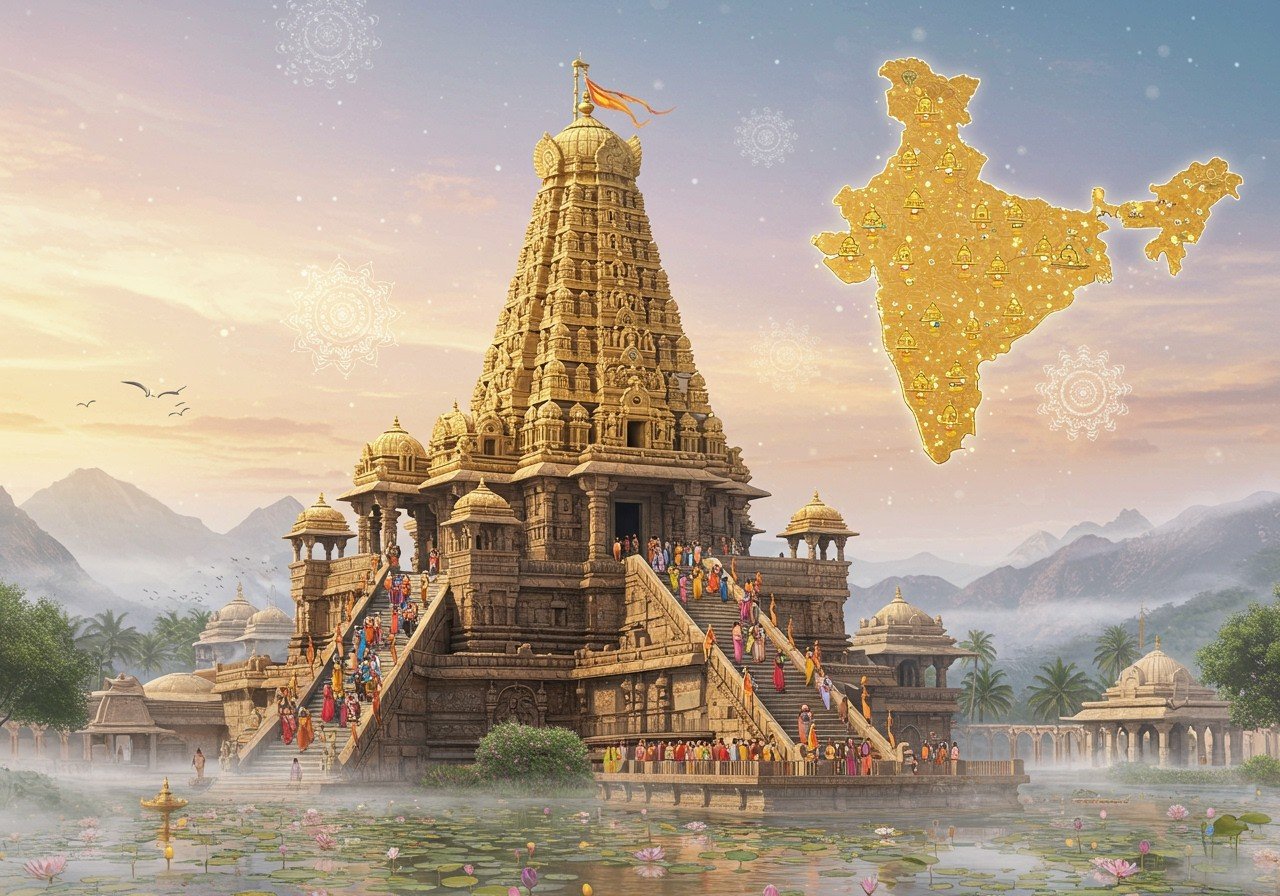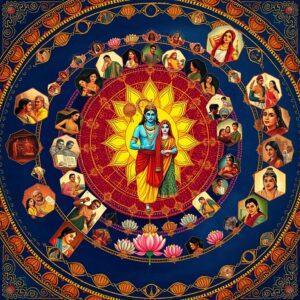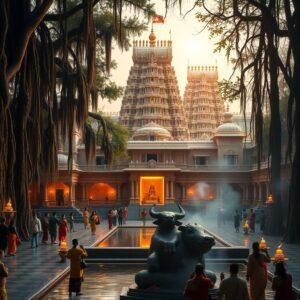
Venkateswara, an incarnation of Lord Vishnu, is a highly revered deity in Hinduism, particularly in Southern India. While the Tirupati Balaji Temple in Andhra Pradesh is renowned, numerous other Venkateswara temples across India hold equal significance. This article explores these lesser-known temples, delving into their unique histories, architectural marvels, and cultural importance.
Historical Significance of Venkateswara Worship
Venkateswara worship has deep roots in the Vaishnavism tradition, with mentions in Vedic texts and Puranas. The Alvars, poet-saints, played a crucial role in popularizing the Venkateswara cult.
The Vijayanagara Empire witnessed a significant rise in the prominence of Venkateswara temples. Many of these temples are included in the ‘Divya Desams,’ 108 sacred temples of Vishnu. South Indian Venkateswara temples are known for their distinctive architecture and rituals. Even today, Venkateswara remains a central figure in Hindu worship and pilgrimages.
Key Venkateswara Temples Beyond Tirupati
Several significant Venkateswara temples are located throughout India:
- Sri Kalyana Venkateswara Swamy Temple in Srinivasa Mangapuram, Andhra Pradesh: This temple is renowned for its historical and religious significance, attracting devotees from all over. It is believed that Lord Venkateswara appeared here as Kalyana Venkateswara Swamy before proceeding to Tirumala.
- Sri Venkateswara Temple in Dwaraka Tirumala, Andhra Pradesh: Also known as Chinna Tirupati (Little Tirupati), this temple boasts unique features and legends. It is believed to be an equally auspicious place to seek Lord Venkateswara’s blessings.
- Venkateswara Temple at Rishikesh, Uttarakhand: This temple holds a special place for North Indian pilgrims. Located on the banks of the Ganges, it offers a serene atmosphere for worship and reflection.
- Venkateswara Temple in Chennai, Tamil Nadu: This temple is notable for its modern architecture and its integral role within the local community. It serves as a hub for religious and cultural activities.
- Venkateswara Temple in New Delhi: Established by the Tirumala Tirupati Devasthanams (TTD), this temple aims to promote Venkateswara worship in Northern India. It offers a convenient location for devotees in the capital city.
- Sri Venkateswara Swamy Temple in Bengaluru, Karnataka: This temple holds great importance for local devotees. It is known for its vibrant festivals and active community involvement.
Other notable temples exist in Kerala, Maharashtra, and other states, each with its own distinct traditions and narratives.
Architectural Marvels of Venkateswara Temples
Venkateswara temples are celebrated for their architectural grandeur:
- Dravidian Architectural Style: Characterized by towering gopurams (gateway towers), intricate carvings, and expansive courtyards. This style showcases the rich artistic heritage of South India.
- Sri Kalyana Venkateswara Swamy Temple: This temple features a stunning vimana (temple tower) and beautiful mandapams (halls), exemplifying the Dravidian architectural style. The intricate carvings and sculptures narrate stories from Hindu mythology.
- Garbhagriha (Sanctum Sanctorum): The most sacred space within the temple, housing the idol of Venkateswara. It is the focal point of devotion and reverence.
- Vijayanagara Influence: The Dwaraka Tirumala Temple showcases the influence of the Vijayanagara Empire in its design. This style is marked by grandeur and intricate detailing.
- Traditional Construction Materials: Granite, symbolizing strength and durability, is commonly used in the construction of these temples. This material contributes to the longevity and timeless beauty of the structures.
Modern architectural elements are incorporated into newer temples such as those in New Delhi and Rishikesh.
Cultural and Ritual Practices
The cultural and ritual practices associated with Venkateswara temples are rich and diverse:
- Daily Rituals (Nitya Kalyanam): Regular services are conducted to honor the deity, maintaining a continuous cycle of worship and devotion.
- Festivals: Brahmotsavam, Vaikunta Ekadasi, and Rathasapthami are major festivals celebrated with great fervor and enthusiasm. These festivals attract large crowds of devotees and are marked by elaborate rituals and processions.
- Unique Rituals: Special events like ‘Kalyanotsavam’ (celestial wedding) and ‘Sahasra Deepalankara Seva’ (thousand lamp service) add to the rich tapestry of temple rituals. These events offer devotees a unique opportunity to witness and participate in sacred ceremonies.
- Prasadams: Sanctified offerings like ‘Laddu’ and ‘Pulihora’ are distributed to devotees as a symbol of divine blessings. These offerings are considered sacred and are believed to carry the blessings of the deity.
- Traditional Music and Dance: Carnatic music and Bharatanatyam performances enhance temple rituals, adding an element of artistic beauty and spiritual elevation. These performances are often dedicated to the deity and are an integral part of temple culture.
- Community Activities: The temples actively engage in charitable initiatives, contributing to the welfare of the local community. This involvement reflects the social responsibility and compassionate nature of religious institutions.
Temple priests play a vital role in preserving the sanctity of rituals and traditions.
Pilgrimage Experience
Visiting these Venkateswara temples offers a deeply spiritual experience:
- Reaching the Temples: Information regarding transportation options and optimal visiting times is readily accessible. This ensures a smooth and convenient pilgrimage for devotees.
- Accommodation: Temple-managed guest houses and dharamshalas provide comfortable lodging for pilgrims. This facilitates a longer stay and deeper immersion in the spiritual atmosphere.
- Pilgrimage Benefits: Undertaking a pilgrimage (yatra) is believed to bring spiritual fulfillment and blessings. It is seen as a journey of self-discovery and connection with the divine.
- Participation: Pilgrims can actively participate in rituals like ‘Angapradakshinam’ (rolling around the temple), enhancing their spiritual connection. This act of devotion demonstrates humility and surrender to the divine.
- Tips for First-Time Pilgrims: Understanding dress codes, appropriate offerings, and temple etiquette is crucial for a respectful visit. This knowledge helps first-time pilgrims navigate the temple environment with ease and reverence.
- Community Spirit: Shared experiences among pilgrims foster a sense of community and strengthen the spiritual journey. The collective energy of devotion creates a powerful and uplifting atmosphere.
Technology has simplified the process of booking darshan (viewing the deity) and sevas online.
Role of Venkateswara Temples in Modern Society
Venkateswara temples play a vital role in contemporary society:
- Preserving Arts and Crafts: Traditional arts and crafts flourish under temple patronage, ensuring the continuation of ancient skills and artistic traditions.
- Educational Initiatives: Temple authorities often run Vedic schools and cultural training centers, promoting education and cultural preservation.
- Social Welfare Programs: Temples actively contribute to healthcare, disaster relief, and community development initiatives, demonstrating their commitment to social responsibility.
- Employment Opportunities: Temples generate employment opportunities for priests, artisans, and support staff, contributing to the local economy.
- Environmental Initiatives: Many temples implement tree planting and waste management programs, promoting environmental consciousness and sustainability.
- Community Cohesion: Temples serve as centers of community cohesion, providing a sense of identity, shared values, and continuity across generations.
Digital platforms have extended the reach of temple services and rituals to a global audience.
How Poojn.in Enhances Your Connection with Lord Venkateswara
At Poojn.in, we empower your spiritual journey by offering authentic puja items and divine idols. Our meticulously curated selection facilitates a deeper connection with Lord Venkateswara within the comfort of your home.
For devotees wishing to create a personal shrine, we offer:
- Sacred Laddu Gopal idols: Available in various sizes, these are ideal for home worship, allowing you to personalize your sacred space. Laddu Gopal – 8 No and Laddu Gopal – 5 No are particularly popular choices.
- Complete puja sets: These sets contain all the essential items for Venkateswara worship, simplifying the process and ensuring you have everything you need.
- Pure brass and copper items: Meeting temple standards, these items enhance the authenticity and sanctity of your home worship. Our pure copper snake and pure brass trishul are crafted with precision and reverence.
- Traditional diya and aarti items: Essential for daily rituals, these items help you maintain a consistent practice of devotion.
We guarantee:
- Authenticity: 100% authentic materials and craftsmanship, ensuring the highest quality and spiritual significance.
- Careful Handling: Sacred items are packaged with utmost care and respect.
- Delivery: Pan-India delivery, bringing the divine directly to your doorstep.
- Expert Guidance: Our team provides expert guidance on product selection, helping you choose the most appropriate items for your needs.
Visit Poojn.in to discover our complete collection of puja items and bring the divine presence of Lord Venkateswara into your home.
Embracing the Legacy of Venkateswara Temples
Exploring Venkateswara temples beyond Tirupati provides a glimpse into India’s rich cultural and spiritual heritage. Each temple, with its unique charm, stands as a testament to ancient traditions, architectural brilliance, and profound devotion. These temples serve as community pillars, offering spiritual solace and fostering unity among devotees.
By visiting these sacred sites, we honor our ancestors, preserve our traditions, and experience the divine presence of Lord Venkateswara. Whether you seek spiritual growth, architectural beauty, or cultural enrichment, the journey to these temples is a fulfilling experience. Embrace the legacy of Venkateswara worship and let it inspire your spiritual path.
May your visits to these hallowed temples bring you peace, joy, and divine blessings.
FAQs on Venkateswara Temples in India
What makes Venkateswara temples significant in India? Venkateswara temples hold immense spiritual and cultural importance, dedicated to Lord Venkateswara, an incarnation of Lord Vishnu, attracting devotees seeking blessings and spiritual solace.
Where can I find the famous Venkateswara temple in Tirupati? The renowned Venkateswara temple is situated on the Tirumala hills in Tirupati, Andhra Pradesh, drawing millions of pilgrims annually.
Are there any other significant Venkateswara temples besides the one in Tirupati? Yes, several other notable Venkateswara temples exist across India, particularly in states like Tamil Nadu, Karnataka, and Maharashtra, each with unique traditions and histories.
Is there a Venkateswara temple in Hyderabad? Yes, Hyderabad houses a well-known Venkateswara temple, the Venkateswara Swamy Temple, located in Chikkadpally, serving as a significant religious site for local devotees.
What are the typical rituals performed in Venkateswara temples? Common rituals include Suprabhatam, Thomala Seva, Archana, and Ekantha Seva, though each temple may also have its own unique set of rituals and customs.
Can devotees participate in the temple rituals? Yes, devotees can participate in various rituals, but it’s recommended to check the specific temple’s guidelines and timings for participation details.
When is the best time to visit Venkateswara temples? While Venkateswara temples welcome visitors year-round, peak seasons are during festivals like Brahmotsavam and Vaikuntha Ekadashi, offering a vibrant and immersive experience.


